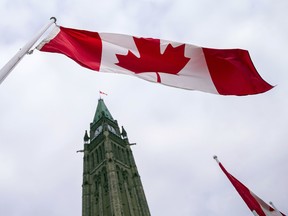
Article content
It doesn’t get any clearer.
Advertisement 2
Article content
Of the people surveyed by the Privy Council Office, 100% said the federal cabinet is “headed in the wrong direction” when it comes to immigration, according to Blacklock’s Reporter.
“Asked whether they felt the government of Canada was on the right or wrong track when it came to managing the immigration system, all believed it was headed in the wrong direction,” said a Privy Council report.
“It was strongly believed the rate of immigration needed to be temporarily stabilized.”
The federal government’s immigration levels plan has quotas of 485,000 people in 2024, another 500,000 in 2025 and 500,000 more in 2026.
Recommended from Editorial
-

Canadians becoming more sharply divided over record high immigration quotas: Study
-

LILLEY: As Trudeau botches immigration, poll shows falling support
Article content
Advertisement 3
Article content
These figures don’t include 1,040,985 foreign students and 766,250 migrant workers let into Canada in 2023.
“Several expressed the view that the rate of immigration had been too high in recent years and that action needed to be taken to temporarily reduce the number of people coming to Canada, including refugees and those seeking asylum,” said the report Continuous Qualitative Data Collection of Canadians’ Views.
“It was felt that the current capacity of infrastructure and vital services could not accommodate further increases to the population and that a priority needed to be placed on supporting those already living in Canada.”
The research was based on focus groups across Canada done under an $814,714 contract with Toronto-based pollster The Strategic Counsel.
Advertisement 4
Article content
RECOMMENDED VIDEO
The other big observation in the report was that immigration should be restricted to foreigners who fill labour shortages.
“It was felt a priority should be placed on more targeted immigration going forward with a primary focus on bringing in skilled workers in areas such as health care and education, which were believed to be facing widespread labour shortages at present,” said researchers.
Respondents felt current immigration policy merely added costs.
“A number identified what they viewed as a higher rate of immigration in recent years as a contributing factor to rising housing costs,” wrote researchers.
“It was believed that as more people entered the country, the increasing demand for housing had driven up housing prices even further.”
Article content








